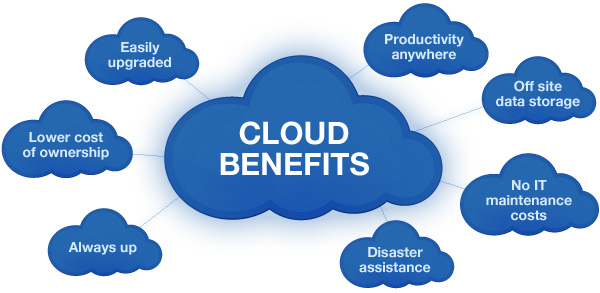Cloud computing is becoming common in offices as companies look to boost the productivity of employees, enhance their accessibility and create a mobile-friendly environment. For most businesses, the decision to migrate to the cloud is an easy one. For others, the benefits and drawbacks need to be closely considered before a decision is made.
The cloud can be so much more than just a place to store files. Storage is often the first need companies identify that brings them to cloud storage, but the additional benefits of cloud computing extend far beyond simply storing data.
The cloud is a way to store data and storing data is a central, fundamental function of computers and computing environments. When your organization considers a move to cloud computing, it's important to understand what the Cloud is and is not.
Cloud storage can save your business money, allow your business to run more efficiently, increase productivity and so much more. Here is a look at the benefits of cloud computing:
Saves space.
If you’re looking to save on space around the office and more efficiently use the space you already have, cloud computing helps you reduce your physical footprint by freeing up valuable workspace that’s currently devoted to IT infrastructure. Rather than using an entire room to house servers and data centers, and clogging rooms and hallways with bulky cables, you can have a much smaller IT footprint with wireless devices and limited servers on your premises.
Reduce capital investments.
Cloud computing does not require large upfront investments of capital resources to purchase servers, install cables/cords or buy software licenses. You pay a monthly usage fee to your cloud provider, and they take care of the costs associated with purchasing, operating and maintaining the infrastructure that supports your cloud-based activities.
Plus, by storing all your data in the cloud, those physical servers aren’t needed anymore, and neither are the maintenance costs, staffing costs, replacement costs and infrastructure costs associated with them.
Increase accessibility.
The Cloud is accessed through the Internet, so all your files will be accessible from any location. For employees who work remotely, this access can be an important source of job satisfaction. It can also improve productivity.
Saves money.
Physically backing up data can be expensive. There’s a cost for the hardware and software you use – and in the event of a disaster, there are the costs of data recovery. From the hardware investment to the personnel required to maintain the infrastructure, on-site storage costs add up. With the cloud, you pay for what you need, as you need it. Cloud storage reduces the need for extensive on-site infrastructure, eliminating much of that initial hardware investment. Rather than a capital expenditure, cloud services are a reoccurring monthly operational expense that’s easy to predict and budget.
Increase security.
Cloud computing protects your business from hardware failure, which helps to prevent file loss. The cloud is the ultimate backup system to prevent this kind of loss with multiple redundancies built into its data center.
Cloud computing also protects you from hackers and data breaches. With the cloud, you have outsourced this security to a team of professionals who stay up-to-date with all the complexities of an ever-changing threat environment.
Provide flexibility.
The cloud provides the ability to work from anywhere, from any device, at any hour during the day. Employees today expect to always be connected – and the cloud makes that possible. So, whether your training team is out on location or your working parents need to stay home with sick kids, the cloud enables them to be productive in their downtime.
Increase productivity.
While not every job lends itself to working from home, many office jobs have some component that could be done remotely. In fact, a Harvard study found that over 40% of people would give up a portion of their salary if they were offered the option to work from home. Cloud computing enables employees to work from home, without interrupting productivity. An employee can access their workstation remotely just as though they were sitting at their desk.
Cloud computing enables businesses to put a much more efficient system in place to meet their needs and provide reliable connectivity. Remember that the way you store your data matters. The benefits provided by a cloud computing environment can be an important competitive advantage for businesses both small and large. Call Tri-Copy today to schedule a free consultation. Tri-Copy is skilled to help determine the best solutions for your business.




